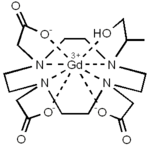Gadoteridol
 | |
| Systematic (IUPAC) name | |
|---|---|
|
gadolinium(+3) cation; 2-[4-(2-hydroxypropyl)-7,10-bis(2-oxido-2-oxoethyl)-1,4,7,10-tetrazacyclododec-1-yl]acetate | |
| Clinical data | |
| AHFS/Drugs.com | Micromedex Detailed Consumer Information |
| Legal status |
|
| Routes of administration | IV |
| Identifiers | |
| CAS Number |
120066-54-8 |
| ATC code | V08CA04 |
| PubChem | CID 60714 |
| DrugBank |
DB00597 |
| ChemSpider |
54719 |
| UNII |
0199MV609F |
| KEGG |
D01137 |
| ChEBI |
CHEBI:31643 |
| ChEMBL |
CHEMBL1200593 |
| Synonyms | (10-(2-(hydroxy-κO)propyl)-1,4,7,10-tetraazacyclododecane-1,4,7-triacetato(3−)-κN1,κN4,κN7,κN10,κO1,κO4,κO7)-gadolinium |
| Chemical data | |
| Formula | C17H29GdN4O7 |
| Molar mass | 558.68 g/mol |
| |
| |
| | |
Gadoteridol (INN) is a gadolinium-based MRI contrast agent, used particularly in the imaging of the central nervous system. It is sold under the brand name ProHance.
References
- Bracco Diagnostic Inc. (May 2007). "Gadoteridol (ProHance) prescribing information (revised May 2007)". DailyMed. U.S. National Library of Medicine. Retrieved 2008-07-13.
| ||||||||||||||||||||||||||||||||||||||||||||||||
This article is issued from Wikipedia - version of the Sunday, June 28, 2015. The text is available under the Creative Commons Attribution/Share Alike but additional terms may apply for the media files.